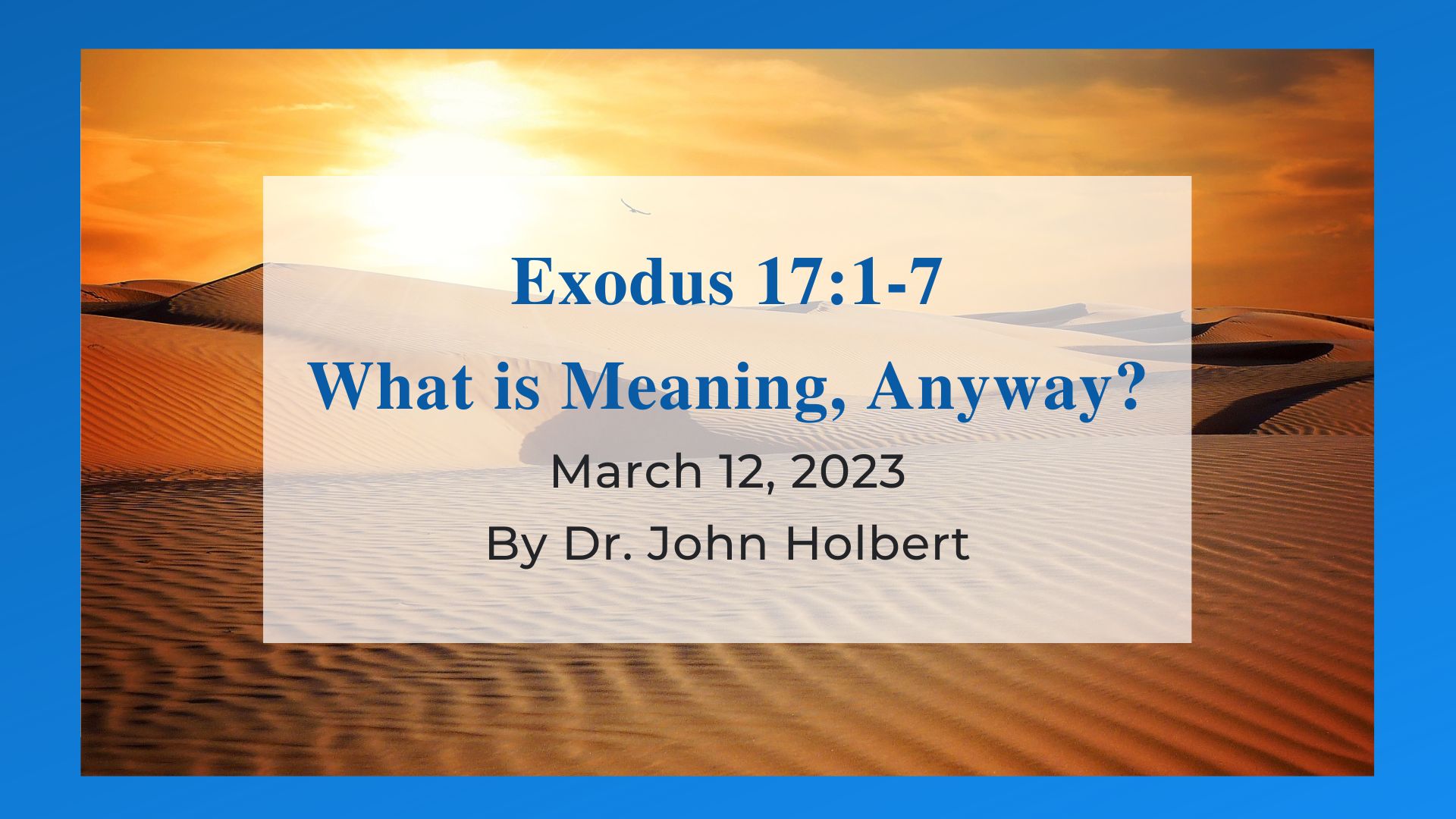What is Meaning, Anyway - Exodus 17:1-7
by Dr. John Holbert on Monday, March 6, 2023

What is Meaning, Anyway?
Exodus 17:1-7
The Peripatetic Hebrew Bible Preacher
The Bible is a book filled with puzzles. And it also is filled with meanings, like any text that we are able to read. Of course, any preacher knows this, and is forever on the lookout for meanings that she can share with her congregation Sunday after Sunday. But to ask the question of the meaning of any text is to ask a very complicated question. Is the meaning what the author meant, what it may mean to this or that reader, or something else entirely different? After all, we have very few biblical author identifications, and even if we do have an identification, for example, the Apostle Paul, can we finally know what the apostle meant two thousand years ago, writing in Greek, and writing to people we can know something about but in reality not all that much?
This problem is doubled when the author of a text is completely unknown, and the recipient or audience of the text is equally unknown. So, here we are today with Exodus 17, a relatively well-known story of the grumbling people in the wilderness, after their escape from Egypt, who find themselves alone in the vast deserts of Sinai, and in desperate need of water. They demand from Moses some way to quench their burning thirst, but his immediate and obviously exasperated cry is “Why grumble at me? That only tests YHWH.” But their complaint only grows louder, “Why did you bring us out of Egypt only to murder us and our livestock with thirst?” And now a desperate Moses cries out to YHWH, “What shall I do with this people?” Note the demonstrative pronoun “this”. One uses demonstrative pronouns when differentiating stridently a group from oneself. “They are about ready to stone me,” Moses concludes, with a distinctly hyperbolic and whiny tone. YHWH replies in a similar tone, as I hear it at least, and reminds Moses of the magic staff that he used to part the waters of the Sea of Reeds in one of the Bible’s most memorable stories. “Strike the rock at Horeb,” says YHWH, “and water will come out of it.” He does, and it does. YHWH provides again.
So far, the story sounds like another example of a magic tale of YHWH’s power and the people’s lack of trust. Is that the meaning of the text? Well, it may be one meaning. But vs.7 throws a possible wrench into that simple reading. “He (Moses, I assume) named the place Massah (“test” in Hebrew) and Meribah (“quarrel” in Hebrew), because the Israelites quarreled and tested YHWH, saying, “Is YHWH with us or not?” Hence, another possible meaning is that the story is less about YHWH’s power than it is about the people’s decided lack of trust in both YHWH and Moses.
So, which is it? YHWH’s magic power, or the people’s lack of trust? Or is it both, or neither? Could there be another meaning? I am reminded of one of the great literary parables of Jesus, found in Matthew’s Gospel, chapter 20, known commonly as “the laborers in the vineyard.” It is a very well-known tale about hiring workers for a vineyard. Groups are hired to work at four different times in the day, thus some work 12 hours, some 9, some 6, and some only 1 or so. Yet, at the end of the day, all are paid exactly the same one day’s wage. The 12-hour workers are (rightfully?) Indignant, and demand from the owner an explanation. He tells the 12-hour workers that they agreed when hired for the wage, and decided to offer all workers the same rate, saying, “I choose to give to this last the same as I give to you.” The parable concludes, presumably, at vs.16: “So the last will be first, and the first will be last.” That sounds like a Jesus idea, all right, but is that what the parable “means”? I certainly hear it rather differently, when I recall the giving of the wage is the owner’s “choice.” It sounds to me like a radical demand to treat all the same, regardless of their work habits or convictions. The “first/last” dichotomy sounds a bit simplistic for the radical sound of this parable.
So what about Ex.17? To me, the final question of vs.7 sounds a powerful note. “Is YHWH with us or not,” is the basic question of any would-be believer, and the faithful answer to such a question cannot be based on the magical appearance of water from rocks, but on something less tangible, based on trust and conviction rather than certainty. Still, there are meanings and then there are meanings, and yours may not always be mine. The wonder of the Bible is found exactly there; its riches are unplummable, a well so deep as to muffle any sound of a pebble tossed in.
